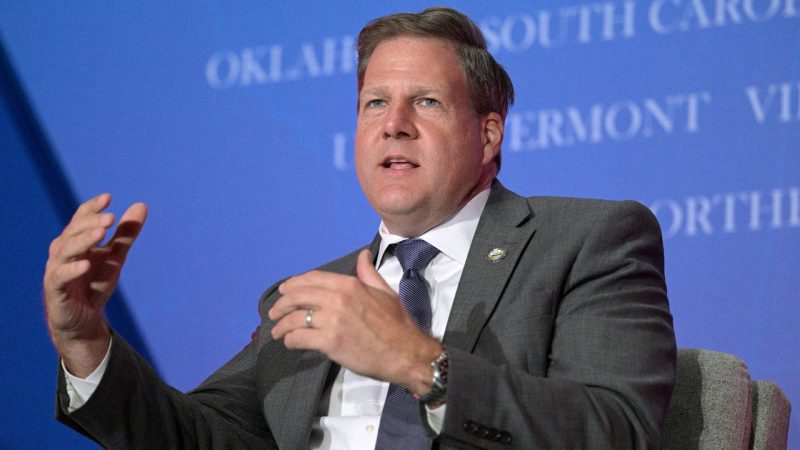Promoting what he called ‘pathways of opportunity,’ New Hampshire Gov. Chris Sununu proposed a two-year $14.9 billion budget Tuesday that includes hefty pay raises for state employees, more money for schools and a streamlined professional licensing system designed to attract new workers.
The total, which includes federal funds, would be a 12% increase over the current biennial budget. It assumes current revenues will hold steady, includes no new taxes or fees and would boost the state’s ‘rainy day’ fund by $180 million.
‘Government is not here to guarantee a solution to your problems, but it is here to give a pathway to opportunity,’ he told lawmakers. ‘Pathways for economic growth, pathways for educational opportunity, pathways for lower taxes and pathways for more personal freedoms.’
Sununu, who was elected to a fourth two-year term in November, also is considering a run for president in 2024 and has been bolstering his name recognition with travel and media appearances. He claims other governors frequently ask him for the secret to New Hampshire’s success, which he said comes down to managing money smartly with a budget that prioritizes people over programs.
‘We can not let this budget serve as a vehicle for partisan maneuvering,’ Sununu said. ‘It must be about the individual, our employees, our children and our taxpayers.’
During the last budget cycle, abortion opponents added to the budget a provision banning the procedure after 24 weeks of pregnancy. Sununu signed it, saying the alternative would have been a veto that would have shut down state government during the coronavirus pandemic.
His new proposal includes several items aimed at boosting the state’s workforce, including the largest pay increase for state employees in nearly 50 years. There are roughly 10,000 state workers, all of whom would get 10% increases in the first year of the biennium and an additional 2% the second year. That proposal, which was negotiated with labor unions, is meant to address a state workforce vacancy rate of 20%, but Sununu’s budget also includes more targeted investments in specific industries.
He proposed increasing the reimbursement rate for Medicaid health care providers by 3%, providing student debt relief for those who pursue careers in mental health treatment and streamlining the state’s professional licensing system. Sununu wants to allow someone licensed to do a specific job in another state to perform the same work in New Hampshire without getting re-licensed. He also wants to eliminate 34 outdated licenses and 14 underutilized regulatory boards.
‘Let’s remember who we are, let’s remember it’s about individual freedom,’ he said. ‘Less red tape and more common sense, that’s how we grow our economy.’
With an eye to the workforce of the future, Sununu proposed spending $5 million to certify hundreds of new computer science teachers and bring robotics instruction to every middle and high school classroom. The biggest education-related proposal amounts to spending $200 million over the next two years by changing the formula used to send money to public schools.
Both the base per pupil amount and the amount sent to schools with a high percentage of students receiving low-cost or free lunches would be increased. A third funding stream, known as stabilization grants, would be phased out over five years and would be replaced by new grants targeting the neediest communities.
Education freedom accounts, which allow low-income families to use state aid to pay private school tuition, also would get a boost. Sununu wants to double funding for the program and expand income eligibility for certain children, including those in foster care, those who have been bullied and those with disabilities.
House Democratic Leader Matt Wilhelm, D-Manchester, pointed to that funding as proof that Sununu’s budget is ‘filled with partisan policy priorities.’ But he also saw opportunities for collaboration in areas such as workforce development and affordable housing.
‘Today was an important first step in the process,’ he said in a statement. ‘House Democrats look forward to working with the Governor and our colleagues to craft a budget that gives all Granite Staters an opportunity to succeed.’
Senate President Jeb Bradley, R-Wolfeboro, said the governor has worked hard to make New Hampshire more competitive, lower taxes and encourage economic growth.
‘This budget is no different,’ he said. ‘I think it’s great that we’re going to try to address education funding, that will be property tax relief across the board. And I think his effort to streamline the office of the professional licensure is going to make a huge difference in terms of trying to attract professionals, especially health care professionals, to come to New Hampshire.’

